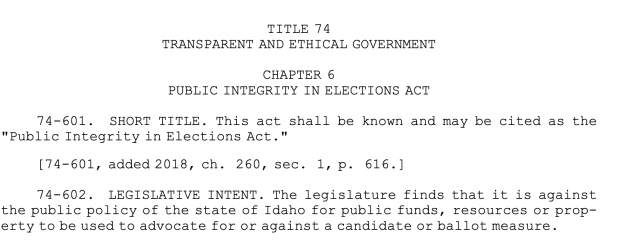A failed $250 million bond issue in November was just the first domino to fall in the Idaho Falls School District.
That election would eventually lead to two court battles that the district is still fighting — battles that new Idaho Falls Superintendent Karla LaOrange characterized as “courageous.” Randy Neal, the Bonneville County prosecutor, is not so complimentary — he sees them as wastes of money and time that could be better spent.

Both cases speak to the difficulties of passing bonds in Idaho, and illustrate worst-case scenarios of what can happen when trust frays between school leaders and taxpayers, and when creative solutions to building schools go awry.
Whether the Idaho Falls trustees’ decisions are a cautionary tale or an inspiring story depends on who you ask — and voters’ opinions will become clear after November’s trustee elections. Eight candidates are vying for three board openings; whether incumbents hold their places will say plenty.

But perhaps the more important questions are how these legal battles will impact students, and what implications they hold for districts across the state as they strive to build and repair schools.
One thing’s for sure: There are lessons to be learned.
A failed bond, fed-up taxpayers, and school leaders under fire
Idaho Falls’ November bond effort stirred up a fiery and well-organized opposition group — the local watchdog group D91 Taxpayers — and sparked constituents to file a complaint about district officials with the sheriff. They alleged that then-Superintendent James Shank and district spokesperson Margaret Wimborne had inappropriately used public funds to promote the bond.


Neal then charged the district officials with a civil complaint.
Ultimately, Shank and Wimborne were asked to pay $250 and $125 each, respectively. For a combined $375, which could have been paid without admitting guilt, the issue could have been put to bed, Neal said.
Instead, trustees decided to hire lawyer Marvin Smith with Hawley Troxell — a Boise firm districts often employ to oversee their bonds and levies from conception to elections to implementation— to fight the complaint. That’s stretched the case out in a number of ways — prolonging it, complicating it, and costing taxpayers big dollars, according to Neal.
EdNews asked the superintendent how much the district’s attorney has been paid, and has not yet heard back. We will update this story if that information becomes available.
Neal is not shy about his frustration with the case and the burden it’s placed on his office.
“We do not want to be involved in this,” he said. “The time that is being spent on this is just immense … We’re shorthanded and we’d like to be getting bad guys off the street.”
“We do not want to be involved in this … We’re shorthanded and we’d like to be getting bad guys off the street.” — Randy Neal, Bonneville County prosecutor
And it’s a lose-lose situation for taxpayers, who are footing the bill for both sides of this legal battle.
It’s even a bit ironic, considering this was all started by constituents concerned about the use of public monies.
So why did the district choose what Neal characterized as the long, expensive route instead of just paying the $375?
According to LaOrange, who took over as the district’s leader when Shank left Idaho for another superintendent’s position, it’s because he and Wimborne did nothing wrong — so why would they pay?
“It’s not about the fines, it’s about what’s right and wrong,” said LaOrange, adding that the complaint is “an attempt to obstruct the district’s efforts to share basic factual information with our parents and patrons.”
“It’s not about the fines, it’s about what’s right and wrong.” — Idaho Falls Superintendent Karla LaOrange on why trustees chose to fight the civil complaints.
“Our board has stepped out in courage and they are defending the employees. The board does not believe there is a basis to this complaint and they will fight it vigorously.”
LaOrange takes issue with the prosecutor’s office, for a number of reasons:
- The concern should have been brought to the district’s attention promptly, so it could have been addressed at the time, not months after the fact.
- It’s inappropriate to “file misdemeanor charges against individual district employees who are working on behalf of our students and patrons.”
- The prosecutor’s office should not be spending so much time, money and resources on this case.
- LaOrange said the prosecutor’s office has “blatantly ignored Sunshine Act violations by groups who have opposed the bond,” even though the issue has been brought to their attention.
The fiasco is at a standstill. A judge will decide in November whether it would be appropriate to determine up and down whether the district was in the wrong (in legalese, this is known as a declaratory judgment). If not, the case could go to a jury. Either way, any kind of resolution is months away.
And it’s not the only legal issue facing the district.
A successful ballot measure … that still landed Idaho Falls in legal muck
After November’s record bond issue failed, the Idaho Falls district finally had a bright spot: It ran and passed a $33 million plant facilities levy, which would fund a new elementary school and eliminate some overcrowding.
It’s what Neal termed a “creative” solution — enabling the district to bypass the required two-thirds supermajority for bonds. The plant facilities levy required just 55% approval.
The district got nearly 70%, the supermajority needed to pass a bond.
Hindsight is 20/20, but Neal says the district should have run another bond — because last month, Idaho Falls got news from the Tax Commission that the newly approved levy is not valid.
Trustees plan to fight that finding in court.
Neal says it’s another misstep that’ll end up costing taxpayers — and students.
In the best-case scenario, it would lead to months of delay before construction on the new school could start. In the worst-case scenario, the challenge to the Tax Commission could fail, and then the district would be left back at square one, with no public funds for a new school.
Instead, Neal said the district should acknowledge its mistake and put the measure back on the November ballot as a bond.
LaOrange said trustees have no intention of doing so.
Their thinking: putting the measure on the ballot again, but as a bond, would confuse voters and undermine their will. Plus, staying the course is a “way of protecting local control.”
“But if for some reason the district does not prevail in this case, then we have a clear reason and justification for going back to the voters,” LaOrange said.
In both court cases, LaOrange said trustees are showing “courage and conviction” and “doing what’s right for kids.”
For now, the games of tug-of-war between the district and the prosecutor, and the district and the Tax Commission, are at an impasse with neither side willing or able to let go.
Time will tell who ends up in the mud.
